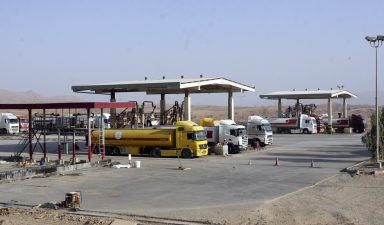 Turkey has been importing condensate from the Khor Mor gas field in Iraqi Kurdistan since October, with daily shipments now reaching 15,000 barrels.
Turkey has been importing condensate from the Khor Mor gas field in Iraqi Kurdistan since October, with daily shipments now reaching 15,000 barrels.
Until recently, bowing to the Iraqi central government’s claim that it controls all oil within the country, the Kurdistan Regional Government (KRG) only exported oil through a pipeline controlled by Baghdad. But after a payment dispute halted that process last month, the KRG has started independently exporting oil out of the country in the other direction — by truck, to the Mediterranean port at the Turkish city of Mersin.
Rising tensions
The KRG first defied the central Iraqi government last July, when it delivered its first direct shipment of gas to Turkey. At that time, it was reported that the KRG hoped to begin directly shipping crude oil to Turkey by August 2013.
Why have independent oil shipments from Iraqi Kurdistan commenced eight months sooner than expected? KRG officials argue that Baghdad hasn’t paid the promised amount for the crude oil that Kurdish oil fields were pumping through the pipeline at the rate of nearly 200,000 barrels per day (bpd) by the end of 2012.
Baghdad paid the KRG an initial sum of $560 million for the oil, but the KRG claims that foreign oil companies operating in Kurdistan are still owed compensation as well. Menawhile, the Iraqi central government maintains that independent shipments out of the country are illegal — and that the region did not meet the volume of export oil it had pledged last September.
The deadlock is unlikely to break any time soon, meaning that the KRG may be selling its oil and gas independently for several months to come. This may be the first step in a move toward wider economic autonomy by the northern Iraqi region.
An eager customer
Turkey is the only party in this scenario that seems perfectly satisfied.
With an oil addiction that is one of the biggest drags on its economy, and the recent sanctions imposed on Iran, one of its biggest oil suppliers, Ankara has been careful not to alienate its oil-wealthy friend, the KRG, throughout this dispute.
Iraqi Kurdistan has better operating conditions and has signed more profitable production-sharing contracts with oil giants, including ExxonMobil and Chevron, than southern Iraq.
In return for the direct shipments of oil and gas, Turkey supplies the KRG with much-needed refined products.
As with most hydrocarbon disputes in the Middle East, however, this one is likely to end in tears — or at best, a protracted hostile silence between the KRG and the central Iraqi government.
“If the Kurdistan Regional Government insists on moving in the wrong direction, even by bartering crude without legal approval, this will worsen the situation and make it more difficult to reach an agreement,” a senior Iraqi oil official told Reuters.
:: Reuters
Read more about oil politics in the region:
Turkey Starts Buying Kurdish Gas Over Baghdad’s Objections
US Sanctions on Iran’s Oil Pressures Turkey’s Energy Supply
Turkey’s Economic Growth Hampered By Oil Addiction, Analysts Say
Image via slemanikurd

